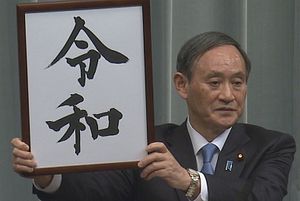To mark the end of Emperor Akihito’s 30-year reign, the Japanese government named the new imperial era “Reiwa,” which translates as “beautiful harmony.” As Emperor Akihito and Empress Michiko step down, the current Heisei imperial era will be replaced with Reiwa to usher in Crown Prince Naruhito’s ascension to the throne on May 1.
Japan uses the imperial calendar alongside the Western calendar. Traditionally two symbolic Chinese characters are joined together to define and reflect on periods of history. The imperial calendar will be reset on May 1, bringing into force an official new imperial dynasty.
But for the first time in Japan’s history, rather than borrowing from Chinese classical literature, the government has drawn from Japan’s oldest known poetry book, called Manyoshu, originating from the first golden age of Japanese civilization. The poetry collection dates back 1,200 years and enshrines a wide array of voices, including the emperor, the royal family, nobles, guards, and peasants. The national poetry book symbolizes Japan’s rich culture and national identity.
Japan’s Prime Minister Shinzo Abe explained at a press conference the inspiration behind the new era name, centering around plum blossoms. “I want Japan to bloom proudly like plum blossoms. Plum blossoms bloom beautifully after winter, which is a sign of spring’s arrival,” he told reporters in Tokyo. Abe said he hopes the new era name will inspire a greater sense of unity and support toward reforms.
The secret discussion to select a new era name from the final round of possibilities began on April 1. The government formally commissioned scholars of classic Japanese texts, Chinese traditional texts, Japanese history, and Asian history to propose symbolic era names. The six proposals collected from final candidates have not been publicly revealed and will be kept in safekeeping along with expert notes from the panel discussions. Sources say the government panel decided on Reiwa as the best fit with near unanimous approval.
Dave Spector, a regular TV celebrity and household name in Japan, went on morning television to express his opinion on the new Reiwa era. He pointed out the unusualness of the selected character “rei,” which is the same character used in the word “meirei,” meaning “to command or order.”
Spector also pointed out that when people first hear “Reiwa” they immediately imagine the character “rei” from the Japanese word for refrigerator, which symbolizes “cool.” This, he argued, gives the new imperial era a cold nuance. He added that the last character, “wa” is one that anyone could come up with.
He concluded that while “Reiwa” isn’t necessarily a bad name, it lacks the impact people were expecting. In Spector’s mind, neither of the selected characters fit the grandeur of an imperial era and are too simple to make a distinct impression on the country’s history books.
Spector was far from alone in finding fault with the Reiwa name.
The former secretary general of the ruling Liberal Democratic Party (LDP), Shigeru Ishiba, told reporters the character combination provoked an “uncomfortable feeling.” He said Abe should have put effort into explaining the meaning of the character depicting “rei” in Reiwa until the public could accept it and reach an understanding.
The Social Democratic Party leader suggested the choice of characters for Reiwa had political motives, saying the Abe administration aims to strengthen discipline and control over society.
Former Japanese Prime Minister Yukio Hatoyama criticized Abe’s heavy media promotion to introduce Reiwa, which included a string of follow up television appearances after streaming the first announcement live on various social media platforms. Hatoyama accused Abe of a popularity stunt and making political use of the emperor. He tweeted: “The government and the media should not appear to be overindulgent.” He also took a jab at Abe’s emphasis on the adoption of a term from Japanese classics, adding, “Abe doesn’t seem to like China but there is nothing you can do about the fact that all Japanese characters originate from China.”
Emperor Akihito’s failing health and repeated wish to abdicate caused a constitutional crisis in Japan. Politicians scrambled to devise special legislation to allow Emperor Akihito to abdicate — making him the first to do so in 200 years. To celebrate the advent of the new Reiwa era, an extra-long 10-day Golden Week National Holiday will take place from April 29 to May 6. After May 1, when Crown Prince Naruhito takes the throne, Emperor Akihito will be addressed as “Emperor Emeritus.”

































